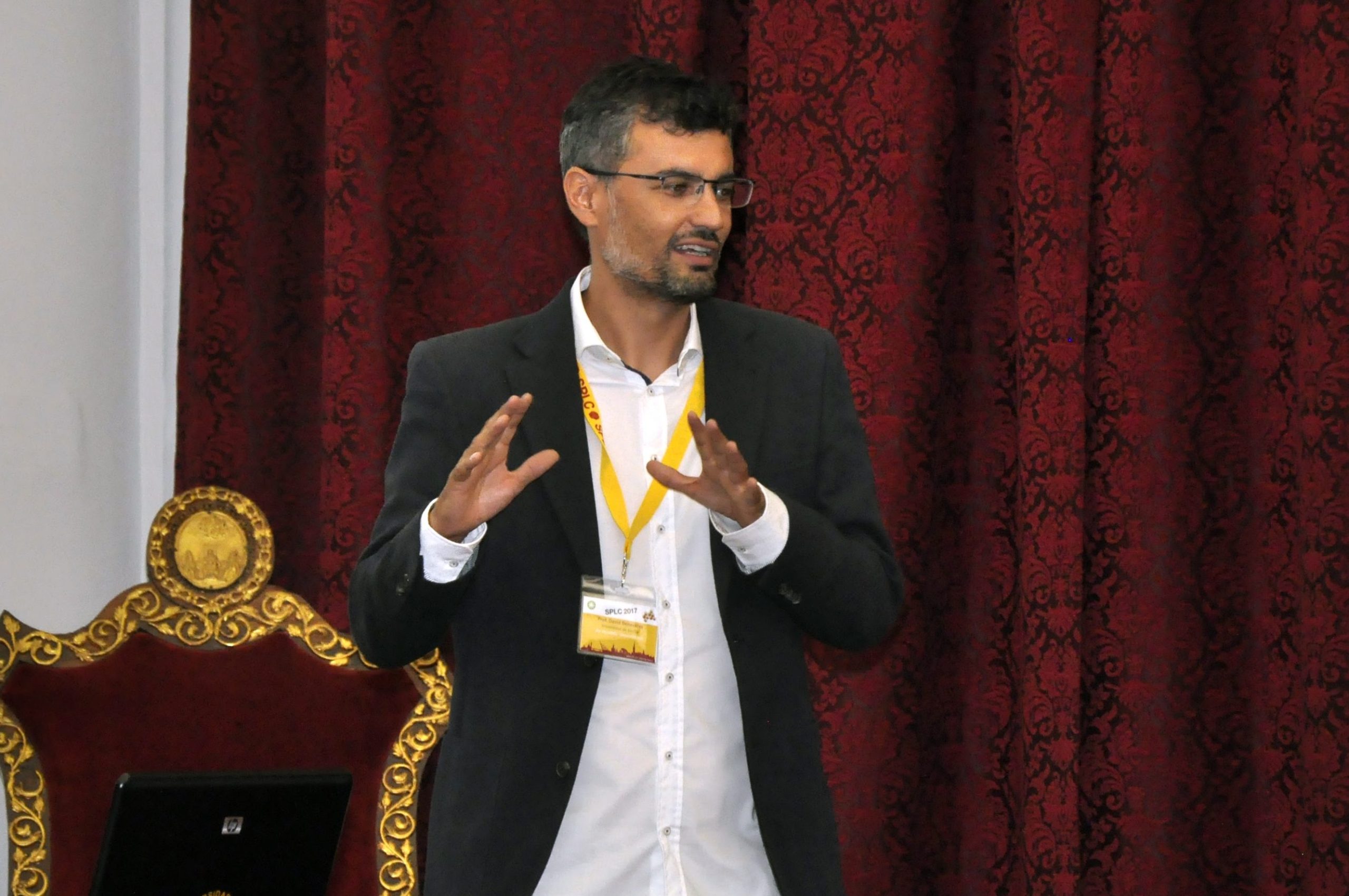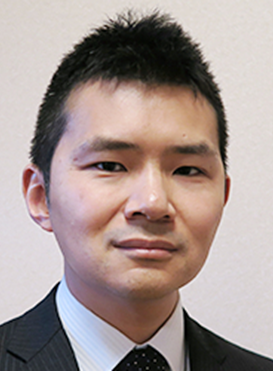David Benavides
(University of Seville)

Keynote title: Data-intensive product lines: embracing past results and new variability challenges
Keynote abstract: In the realm of software product line engineering, feature models have been a cornerstone for over three decades. As we enter a new era defined by the digital revolution, the value of data across diverse application domains is becoming increasingly apparent. This paradigm shift towards data-intensive environments poses fresh challenges that must be addressed through variability management. Data transformation, visualization, generation, and synthesis present ripe opportunities for leveraging variability techniques. Moreover, the growing prominence of data-intensive product lines emphasizes the need to adapt and innovate in this context. This keynote explores past achievements and contributions while charting a course to embrace these novel variability challenges in data-intensive product lines. The convergence of variability knowledge and data-driven applications can profoundly shape the future of software product line engineering.
Provocative note: This text have been refined with the help of an LLMs.
Bio: Prof. David Benavides received the B.S. degree in information systems from the Institute Superieur d’Electronique de Paris, France, in 2000, and the M.Sc. degree in computer engineering and the Ph.D. degree in software engineering from the University of Seville, Spain, in 2001 and 2007, respectively. He is currently a Full Professor with the University of Seville. He received the SPL Most Influential paper award in 2017 for his 2005 paper on feature model analysis that opened a new field of research. Also, Prof. Benavides received the most influential paper award at VaMoS 2020 for his paper about FaMa, a Java tool for feature model analysis that has been wildly used in academia and industry. In 2012, he served as PC chair at SPLC in Salvador, Brasil, and from 2018 to 2022 he served as SPLC Steering Committee Chair. He has been more than 20 years researching around software product lines and variability, both theoretically and practically. He is the head of the Diverso Lab at the University of Sevilla.
Marianne Huchard
(Montpellier University)

Keynote title: Chronicles of Concept lattices: Unveiling Structure in the Software World
Keynote abstract: Human activities, including software design, development, evolution and maintenance, produce many datasets with various sizes and various degrees of data complexity. Many knowledge discovery (KD) methods have been designed over the years. These methods aim to analyze this data, identify knowledge patterns, classify, reason or produce new data. KD literature provides a diversity of symbolic or statistical approaches that have different purposes, benefits and drawbacks. Formal Concept Analysis (FCA) is a KD method which can help in the context of medium-sized and complex data. Its purpose is to highlight an underlying structure composed of knowledge chunks (concepts) and logical dependencies. It can support interactivity and explanation in a KD process. In this talk, I will review the roots of FCA in lattice theory, several typical extensions for complex data and its links with other KD approaches. I will approach the main obstacles in its usage and a few remediation techniques. I will give a particular focus on the application of FCA to Software Engineering, a field where it has been explored to address many different issues, like locating features, identifying design patterns, class model reengineering or component classification. FCA has also been applied for years in Software Product Line Engineering, e.g. for its ability to build clusters of products provided with a symbolic description, to establish correspondences between several description spaces, or to shed light on variability structuring. I will present a few representative research works in this domain and I will outline opportunities for FCA in the future, in particular in synergy with other AI methods, such as association rules or statistical machine learning.
Bio: Marianne Huchard is a full professor of Computer Science at Montpellier University. She is currently responsible of the computer science department of the LIRMM (Laboratory of Informatics, Robotics, and Microelectronics at Montpellier). She served as the general chair of the IEEE/ACM International Conference on Automated Software (ASE) in 2018, as the program co-chair of the international conference of Concept Lattices and their Applications (CLA) in 2016, and in many scientific committees in software engineering conferences and Formal Concept Analysis conferences. She received her Ph.D. on algorithmic questions connected to the management of multiple inheritance in various object-oriented programming languages at the Montpellier University. She is leading research work in Formal Concept Analysis (FCA) for more than 25 years. She contributed to various aspects of FCA: efficient algorithms; the design of relational concept analysis (RCA), a framework that extends FCA to multi-relational datasets; the connection between RCA and other formalisms, such as propositionalization or description logics; methodology and application of FCA to several domains, including environmental datasets, ontology engineering, and as well software engineering (e.g. class model refactoring, component classification, extraction of model transformation patterns, and software product lines).
Hideto Ogawa, Kentaro Yoshimura
(Hitachi, Ltd.)


Keynote title: The 20-year journey of SPLE in Hitachi and the next
Keynote abstract: Since the mid-2000s, HITACHI group have been engaged in research and development to Software Product Line Engineering(SPLE). During this period, the utilization of software in various hardware products has increased dramatically, in line with the surge in digital appliances and a shift in hardware control from circuits to software. Although software is more malleable than hardware, this flexibility sometimes introduced complexities in management. To address this challenge, we started research on SPLE across various business divisions. HITACHI group has instituted an organizational framework to promote a transformation in software development throughout the business sectors. SPLE has been positioned as a key factor in this transformation, and activities to promote SPLE have been undertaken, including the creation of guidelines, collection of cases, conducting workshops and so on. The target products have been diverse, including home appliances, large-scale network devices, and hardware control devices for automobiles, among others. Additionally, we have conducted collaborative research on advanced SPLE technology with major academic research institutions. Amidst these ongoing activities, generative AI has emerged on the scene. HITACHI have a policy to utilize generative AI in various business scenes, including software development. In this presentation, we will review our SPLE research and discuss the potential applications of generative AI to software development.
Bio Hideto Ogawa: Hideto Ogawa received his Bachelor’s and Master’s degrees in Information Engineering from Nagoya University, Japan, in 1994 and 1996. He then received Ph.D. in Information Science from Japan Advanced Institute of Science and Technology, Japan, in 2015. He joined Hitachi Ltd. and has been engaging in the field of software engineering research, including SPLE and software testing. Currently Dr. Ogawa is a Distinguished Researcher at Hitachi, Ltd., Research and Development group. Dr. Ogawa served as a Co-Chair for the APSEC (Asia Pacific Software Engineering Conference) 2022 SEIP Track and he is also a director of the Information Processing Society of Japan, contributing his expertise to both the industry and academia.
Bio Kentaro Yoshimura: Kentaro Yoshimura received his Bachelor’s and Master’s degrees in Mechanical Engineering from Waseda University, Japan, in 1999 and 2001. He then received his Ph.D. in Information Science and Technology from Osaka University, Japan, in 2009. In 2001, he joined Hitachi Ltd. and now has over 20 years of experience. Currently, Dr. Yoshimura is a Chief Researcher at Hitachi Ltd., Research and Development Group, where he works on software engineering for autonomous and connected control systems, such as automotive and robotics systems. Dr. Yoshimura is also active in the academic community, serving as a Co-Chair for the APSEC (Asia Pacific Software Engineering Conference) 2023 SEIP Track and as a Program Committee member for past SPLC series. He is a Senior Member of IEEE.
Philippe Collet – Doctoral Symposium Keynote
Keynote title: 37 Essential Features of your Ph.D. Supervisor
Abstract: Starting a Ph.D. is always the beginning of an unexpected journey. But completing it is something that should not end in desolation and smog. A PhD involves one student and (at least) one supervisor, that follow together a path drawn by and for research. In this talk, we devise several features, actually 37, that a Ph.D. student could expect from an ideal supervisor. We could also try to present and discuss these 37 features, but it would be overly long and boring. It is more likely that the talk will focus, in a very informal way, on a set of advice to understand, manage, and maybe, manipulate your PhD supervisor.
Bio: Philippe Collet is Full Professor at Université Côte d’Azur / I3S – CNRS, France since 2013. He holds a Ph.D. (1997) and a “Habilitation” (2011) in Computer Science from the same University.
His research focuses on variability management in new complex settings and on reverse engineering variability from large variability-rich software systems that are not organized as Software Product Lines. He was PC co-chair of the VaMoS workshop in 2013, organizing it in 2014, and PC co-chair of SPLC 2020. Together with Mathieu Acher and other coauthors, he was awarded the SLE Most Influential Paper award in 2019 for work on composing feature models published in 2009, which led to the FAMILIAR DSL.
